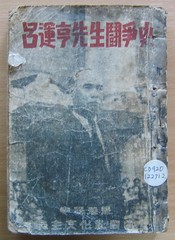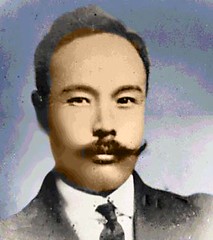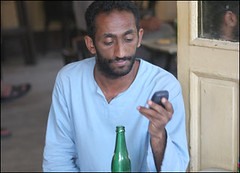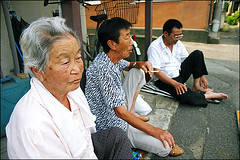
A well-thumbed biography of a Korean nationalist who I've taken a liking to for some reason. Actually I know very little about Yŏ Un-hyŏng, although you can read a short and somewhat hagiographic bio
here at the Kimsoft website and a more prosaic one
here at Wikipedia. He seems to be one of those figures that every developing nation state of the twentieth century must have had - a not-quite great leader.
In the case of Mong-yang (his pen-name), one of the reasons for this is quite plain: he was a centre nationalist at a time (the mid 1940s) when the Korean peninsula was being polarised in two directions towards the 'left' nationalism of the North and the 'right' nationalism of the South. Perhaps you could say more honestly that Korea was being pulled rapidly in one direction by Soviet imperialism and in the other by US imperialism. Nationalists who didn't really want to rely on either of the new great powers tended to be left high and dry.

During his lifetime Yŏ had been in the mainstream of the Korean nationalist movement, operating in Shanghai, Siberia and Japan. He had earlier founded the New Korea Youth Party, but in 1920 he actually joined Korea's first Communist Party and attended the First Congress of the Toilers of the Far East, where he apparently met Lenin. Later he joined the
Kuomintang (Chinese Nationalist Party) and worked for Chiang Kai-shek. According to the Kimsoft biography he was arrested and imprisoned by the Japanese in 1929, although the English Wikipedia entry says that it was the British who arrested him and then handed him over to the Japanese. Interestingly the Korean Wiki entry notes that Yŏ was arrested at Shanghai baseball stadium - I wonder if it still exists?.
At liberation Yŏ emerged as one of the leaders of post-colonial Korea, but the People's Committees and the Korean People's Republic that he helped to form in September 1945 were short-lived and were soon crushed by the US military government (in the North the People's Committees were co-opted by the Soviet/Kim Il-sung regime). During 1946 Yŏ found himself on the left of the nationalist movement but was striving to bring elements of the right and left together in a coalition, working in particular with the main communist leader in the South: Pak Hŏn-yŏng.
One thing that caught my eye about this book was its publication date. It was originally published in 1946, but this edition was reprinted in late July 1947. Yŏ Un-hyŏng had in fact been gunned down at the Hyehwa-dong Rotary in Seoul just a few days before this on July 19, by a hitman thought to have been acting on
Syngman Rhee's orders. Here's a description of the assassination from Kimsoft:
When Yo's car slowed down at the Hyehwa-dong intersection, suddenly, a large truck pulled out from behind the police station and blocked Yo's car. Yo's driver pressed on the breaks and the car came to screeching halt, when the assassin jumped on the rear bumper and fired two pistol shots at Yo through the rear window. One bullet hit Yo's back and came out of his stomach and the other went through his heart, killing him instantly. It was one pm.
According to the Kimsoft biography, the hitman was a rightist refugee from North Korea called Han Chi-gŭn. The site also has a
whole page discussing the assassination.
By a quirk of fate, a combination of the British and Yŏ's love of sport seem to have been his twin nemeses, getting him into trouble on more than one occasion. First when he was arrested at the baseball stadium in 1929 and then again in July 1946, when he was on his way home to change into a clean shirt before attending a friendly football match between British and Korean teams.
If you want more resources on Mong-yang, there is a Wikipedia
entry in Korean and he has his own
website, run by his memorial foundation (every dead nationalist must have one of these it seems).







